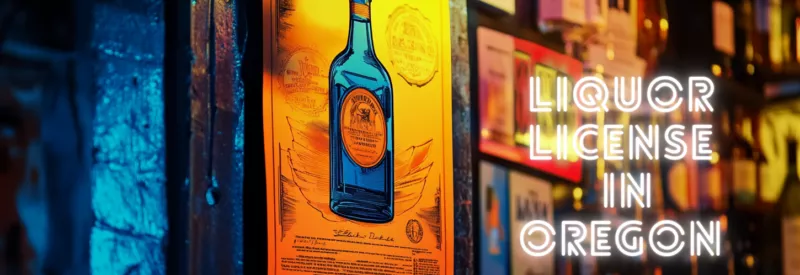From September 2023 to August 2024, Oregon’s liquor sales totaled almost 830 million [1]Oregon Liquor and Cannabis Commission. “Oregon Distilled Spirits Sales.” Accessed October 17, 2024. . If you want to sell alcohol in your bar or restaurant in Oregon, you stand to make a lot of money. But first, you’ll need to get a liquor license. Navigating the licensing process in Oregon involves understanding the available types of licenses, adhering to state and local regulations, and meeting specific business requirements.
This comprehensive guide covers common types of Oregon liquor licenses, the necessary steps for obtaining and renewing them, how much a liquor license is, and the detailed application process. Whether you operate a brewery, winery, bar, or restaurant, this guide offers valuable insights to help you navigate the intricate landscape of liquor licensing in Oregon.
Types of Oregon Liquor Licenses
Oregon provides a range of liquor licenses tailored to suit various businesses selling and distributing alcoholic beverages. These licenses are classified based on factors such as the type of alcohol allowed, the venue for consumption, and the nature of the sale. For details on how to get a liquor license, read further on. Here are some typical types of liquor licenses in Oregon:
- Brewery: This license permits on-premises consumption, including tastings, and requires alcohol server education, a service permit, and liquor liability insurance. However, it prohibits on-premises consumption.
- Distillery: This license allows the production of distilled liquor in Oregon, as well as the import, export, and sale of distilled liquor.
- Full On-Premises Sales, Commercial: With this license, establishments can sell and serve drinks at retail on their premises, offering distilled spirits, malt beverages (beer), wine, and cider. It also enables their sale in factory-sealed containers for take-out and delivery.
- Grower Sales Privilege: This license allows on-premises consumption, including tastings, with requirements such as alcohol server education, a service permit, and liquor liability insurance.
- Off-Premises license: This license allows retail sales for off-premises consumption and includes the sale of malt beverages, wine, and cider in factory-sealed containers.
- Wholesale Malt Beverage and Wine: This license is for on-premises consumption, including tastings, and requires alcohol server education, a service permit, and liquor liability insurance.
- Winery: License for on-premises consumption, including tastings. Requirements include alcohol server education, service permit, and liquor liability insurance.
- Special Event and Temporary Licenses

What type of liquor license do I need?
The type of liquor license you need depends on various factors, such as the nature of your business, the type of alcohol you plan to sell, and whether you intend to allow on-premises consumption.

If you plan to operate a bar, restaurant, or any establishment where customers will consume alcoholic beverages on-site, you need an on-premises consumption license. This license allows you to sell and serve alcoholic drinks within the confines of your licensed premises.
If your business model involves selling packaged alcoholic beverages for customers to consume off-site, such as in liquor stores or retail outlets, you’ll need an off-premises consumption license. This license authorizes the sale of sealed containers of alcohol for consumption elsewhere.
If you produce beer and want to offer on-site tastings or sell your products directly to consumers for consumption at your brewery, a brewery license is necessary. It may have variations depending on whether on-premises consumption is allowed or not.
For businesses engaged in the production, import, export, and sale of distilled spirits in Oregon, a distillery license is what you need. This license allows the legal operation of a distillery within the state.
For temporary or special events, a special event or temporary license is the license you’re looking for. This is often necessary for occasions such as festivals, fairs, or one-time events where alcohol will be available to attendees.
Liquor License Requirements for Oregon
Liquor license requirements in Oregon are overseen by the Oregon Liquor Control Commission (OLCC), and the application process involves various criteria contingent on the type of license sought.
Basic eligibility requires applicants to be at least 21 years old, possess citizenship or legal residency, and comply with federal and state laws. The application process includes submitting a completed form, providing personal and business details, a floor plan, and undergoing a background check. Some licenses may require public notices, and fees vary based on the license type.
For establishments serving liquor within Portland’s city limits, the City of Portland acts as the Local Governing Body, requiring additional information such as personal details, business operations, and a digital copy of a zoning map.
Certain age restrictions apply, with individuals aged 18-20 eligible for a minor service permit. The OLCC considers various factors, including criminal convictions, in the Alcohol Service Permit application process. Restrictions on activities like bartending and alcohol mixing may apply until the individual turns 21, and the OLCC may deny applications based on specific criminal convictions.

Other necessary permits
In addition to a liquor license in Oregon, businesses could need various other permits. These include health department permits for food safety, building permits for construction or alterations, fire safety permits for high-occupancy establishments, and signage permits for business signage. Occupancy permits ensure adherence to safety and building codes, while entertainment licenses and sidewalk café permits may be required for live entertainment and outdoor seating, respectively. Environmental permits address waste disposal, and businesses playing recorded music should consider music licenses.
Understanding Liquor Laws in Oregon
In Oregon, individuals must be 18 or older to work in hospitality, and only those aged 21 or older can enter retail alcohol stores. On-premises businesses can serve alcohol starting at 7:00 a.m. daily, while off-premises businesses, like liquor stores, begin beer sales at 6:00 a.m. Both bars and off-premises businesses close at 2:30 a.m.
Open container laws in Oregon prohibit any open alcohol containers in vehicles or public spaces, with exceptions for designated areas like limousines. The legal blood alcohol limit for non-commercial drivers aged 21 and older is 0.08, and for commercial drivers, it’s 0.04. Those under 21 are considered legally drunk with any detectable alcohol.
Selling alcohol to anyone under 21 is illegal, and the use of false IDs is a crime. Retailers can confiscate fake IDs. Alcohol service permits are required for individuals aged 18 to 20 to serve alcohol with certain restrictions. These permits are mandatory for on-premises liquor businesses and are valid for five years.
Parents can provide alcohol to their minor children in a private residence, but allowing those under 21 to drink on private property that you control is illegal.
How Much Does a Liquor License Cost in Oregon?
Below is a list of the costs of a liquor license in Oregon:
- Brewery: $1,000
- Distillery: $200
- Full On-Premises Sales, Commercial: $800
- Grower Sales Privilege: $500
- Off-Premises Sales: $200
- Wholesale Malt Beverage and Wine: $550
- Winery: $500
- Special Event and Temporary Licenses: $10-$50
How to Apply for a Liquor License in Oregon
So, you’re wondering how to get a liquor license? Follow the steps below.
One: Gather Information and Forms
- Download and complete the Annual Liquor License Application from the OLCC website.
- Collect personal information for individuals with a financial interest, including legal name, social security number, contact information, driver’s license details, and any arrest record.
- Gather information about the business operations, including contact details, hours of operation, and expected activities.
- Obtain an official digital copy of a zoning map for new outlet applications.
Two: Submit the Application
- Create an account on the Civic Portal.
- Log in and select the appropriate application type (e.g., New Application for Initial Application – New Outlet).
- Fill out the required fields related to application information and personal and business details.
- Upload needed documents as PDFs.
- Pay the processing fee (e.g., $100 for New Outlet, $75 for all other Annual application types).
- Submit the application through the Civic Portal.
Three: Submit to the OLCC
- After completing the application and submitting it, you should receive an email recommendation from the City of Portland within 30 to 45 days.
- Add the City of Portland recommendation email document to your annual liquor license application packet for the OLCC.
- Submit directly to the OLCC following the rules on the OLCC website.
To apply for a service permit
- Create an account on the OLCC website.
- Log in and apply for a new service permit, providing personal information.
- Upload an image of your identification (driver’s license, ID card, or passport).
- Pay the service permit charges.
- Take the Alcohol Server Education test by uploading proof of class completion.
- Receive the OLCC’s approval and print your official service permit from the dashboard.
How to Renew Your Oregon Liquor License
To renew your alcohol service permit in Oregon, you need to create an account on the Alcohol Service Permit Portal and reapply within six months before the permit expiration date. The renewal process involves completing the application through the online portal, which typically takes 15 to 30 minutes. Additionally, you’ll need to take an approved Alcohol Server Education class to renew your permit. This can either be in-person or through online providers. The Alcohol Service Permit is valid for five years from the date of issuance, and the entire renewal process goes through the online portal for a faster and more streamlined experience.
License renewal applications are mailed to licensees approximately two months before the expiration date. It’s crucial to return the completed application to the OLCC at least 20 days before the license expires to avoid late fees. Late fees begin on specific dates depending on your renewal district.
Getting a Beer and Wine License in Oregon: Closing Thoughts

There is a lot that goes into getting a liquor license in Oregon. With this guide, you should now have a good understanding of what type of license you need and local and state laws and regulations to make the process easier.
After you get your liquor license, your next step will be to find a restaurant credit card processor so you can accept payments. To be able to take payments from your customers, you’ll need to open a merchant account. A processor that works with bars and restaurants can allow you to handle online to-go orders, delivery, and curbside pickup. At PaymentCloud, we offer white glove services and dedicated support to help your business thrive. Reach out today to see what we can do for you!
FAQs
How long does it take to get a liquor license in Oregon?
After submitting a complete application through the online system, the process takes a minimum of 30 days and up to 45 days. The overall timeline may also be influenced by factors such as the type of license and any additional requirements.
Do you need a liquor license to sell beer or wine in Oregon?
Yes, you need a liquor license to sell beer or wine in Oregon. Different types of licenses are available depending on your business model, such as on-premises or off-premises licenses. You can obtain these licenses through the Oregon Liquor Control Commission (OLCC).
Is it hard to get a liquor license in Oregon?
Obtaining a liquor license in Oregon can be a detailed process, and the difficulty may depend on factors such as the type of license, local regulations, and compliance with state laws. It’s essential to carefully follow the application process, meet all requirements, and obtain necessary approvals.
How long does an Oregon liquor license last?
Oregon liquor licenses typically last for a specific period, and the duration may vary based on the type of license. For example, an Alcohol Service Permit is valid for five years from the date of issuance. Other licenses may have different expiration periods.
How do I get a temporary or one-day liquor license in Oregon?
To get a temporary or one-day liquor license in Oregon, you would typically apply for a Special Event or Temporary License. These licenses are often required for events like festivals, fairs, or one-time occasions where alcohol will be served. The specific process and requirements can be obtained from the OLCC website or by contacting the OLCC directly.




